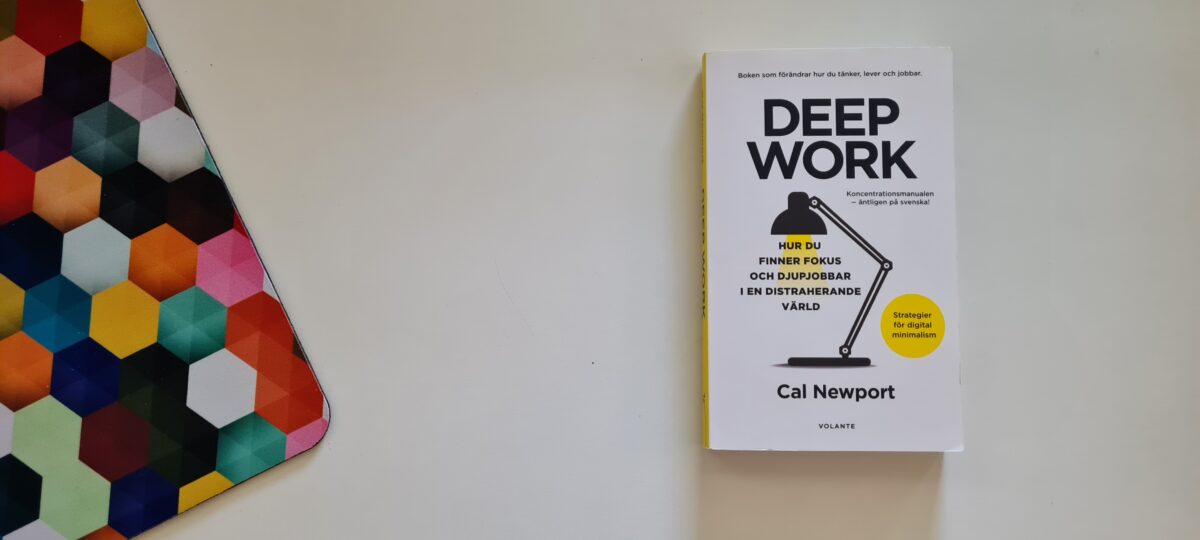Most of can relate to, and reminisce, a moment in our life when we made an important choice, when we reach a subtle decision point. Not long ago I was on my way out of a bookstore when I suddenly caught the attention of a book I had seen before, but disregarded: Deep Work by Cal Newport.
In short, Newport argues that more and more people are losing their ability to focus on one single thing – deep work. Deep work is related to learning and doing an excellent job: being able to learn things very well and also performing them very well without being distracted. Part of his statement, if you want to call it that, is that people who know how to focus and deep work are the ones with higher status and salaries. They will, most likely, be more exempted from rapid changes in the marketplace/workforce and constant job insecurity. People who can deep work are able to work with machines, programs and will always be better at learning even more new things. They are versatile.
He names different people who have learnt to focus intently on one task at a time, such as Carl Gustav Jung, Mark Twain, Bill Gates, J.K. Rowling and Theodore Roosevelt. My favorite is a man changing career to become a software developer. He chose to isolate himself for a while and studied only books on programming and later became one of the best students at a devcamp.
Network services, such as texts, mails, instant messages, blogs, microblogs cause time to be fractured into tiny incoherent pieces. I mean, is sending mails really work? Are we paid to send and receive mails about virtually anything? Who in their right mind pays us to spend time on Facebook, unless it’s explicitly in my job description?
Whenever I think of work today, I picture myself with my back to a mound or a hill. Right behind me is a small tunnel venturing into the hill. I’m able to see the end of it clearly, as well as people there. In front of me is green, billowing hills basking in wonderful sunshine with a clear blue sky as background. Behind me, through the tunnel, I can hear the noise, the hysteric conversations and shouts, the endless chatter, though if I just relax that all goes away.
This is also how I describe my state of mind to people who ask me how I feel and what I do when there’s stress and pressure. I don’t imply I never feel lost or stuck in between chores, but it rarely happens and I can simply turn it off by taking a deep breath. But the difficulty is not I. Instead it’s everyone else stuck on the other side of the tunnel, the hill. The people who so dearly want to be heard, who scream out their importance, who spam me (and others) with mails, phone calls, messages of various kinds, who so desperately want a response, a reaction. I find it sad and somewhat shocking I was once there too, and my greatest issue is explaining this to people who actually are so plainly stuck, that I’m no longer one of them. I don’t long for their hysteric communication, their endless chatter, their constant flow of mails at work, mails with no relevance or coherence. It pains me people are unable to actually communicate properly, because they lack the insight to their own problems.
Newport doesn’t have a one-way ticket for everyone and he concentrates on people working in office, in the service sector, with computers. Thus, it’s hard to read this book and apply most of it if you’re a nurse, a bus-driver or preschool teacher. He introduces several methods and techniques dependent on work, children, age and the like. I won’t go into more details, except for some basic rules:
- Don’t work during evenings
- Don’t work during weekends
- Don’t work on holidays
- Walk or jog a lot
- Don’t spend much (or any) time on social media
Basically, it’s one of the most useful books I’ve ever read. It’s rather short, easy to read and brimful of tips and tricks for creating a better prerequisites for life, not just work. He gives you useful tips on how to actually convert your everyday work into an experience where you actually benefit more than you possibly thought possible.
Back to my bed – Elderbrook
